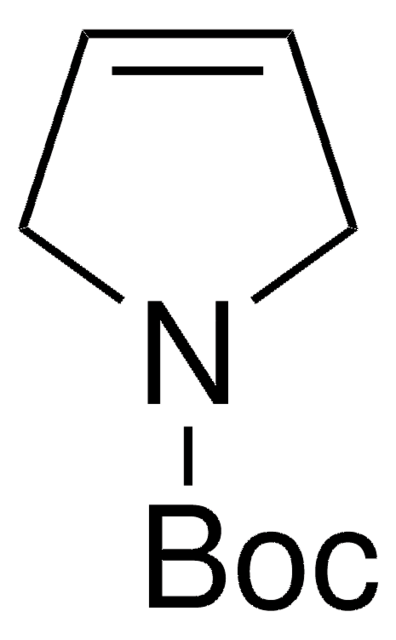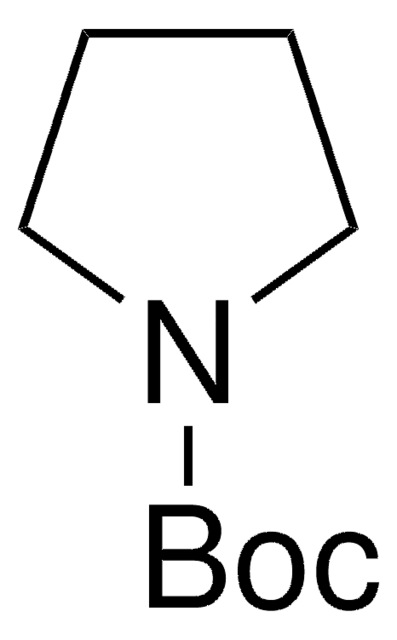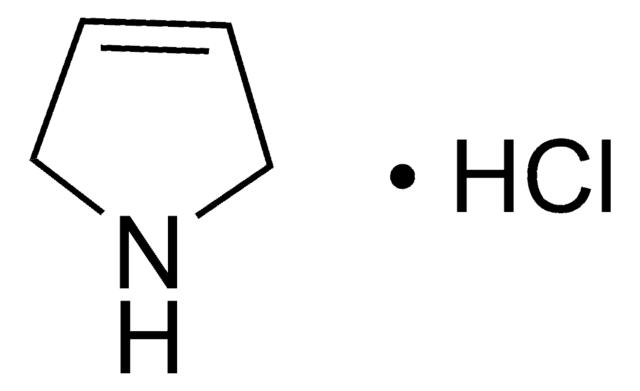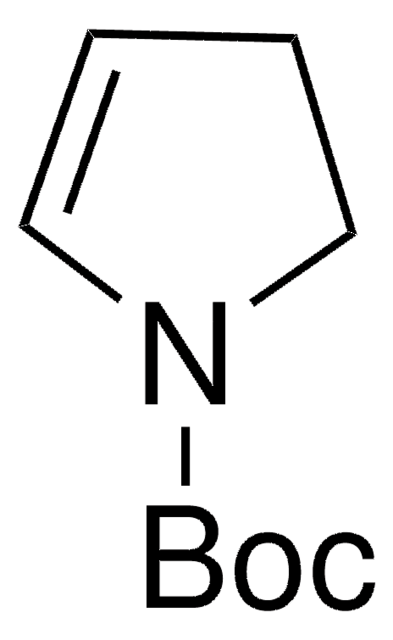All Photos(1)
About This Item
Empirical Formula (Hill Notation):
C4H7N
CAS Number:
Molecular Weight:
69.11
Beilstein/REAXYS Number:
103173
EC Number:
MDL number:
UNSPSC Code:
12352100
PubChem Substance ID:
NACRES:
NA.22
Recommended Products
Quality Level
assay
95%
form
liquid
refractive index
n20/D 1.46 (lit.)
bp
90-91 °C/748 mmHg (lit.)
density
0.91 g/mL at 25 °C (lit.)
storage temp.
−20°C
SMILES string
C1NCC=C1
InChI
1S/C4H7N/c1-2-4-5-3-1/h1-2,5H,3-4H2
InChI key
JVQIKJMSUIMUDI-UHFFFAOYSA-N
Looking for similar products? Visit Product Comparison Guide
General description
3-Pyrroline is a heterocyclic building block. The excited state dynamics of 3-pyrroline by Hamiltonian model based on the vibronic coupling model has been investigated. Trifluoromethylated azomethine ylide is reported as precursor for the synthesis of 3-pyrroline building blocks. 3-Pyrrolines are reported as highly useful intermediates for the synthesis of functionalized pyrrolines, pyrrolidines and other natural products. Preparation of 3-pyrroline(2,5-dihydro-1H-pyrrole) from (Z)-1,4-dichloro-2-butene, via Delépine Reaction has been reported. It is formed as intermediate in the synthesis of N-(tert-butyloxycarbonyl)-3-pyrroline. Reaction of Me3Al and Me3Ga with 3-pyrroline is reported.
Various 3-pyrrolines (2,5-dihydropyrroles) have been synthesized by two-step reaction sequence of alkylation/alkylidene carbene CH-insertion reaction. Synthesis of 3-pyrroline has been reported by employing cis-1,4-dichloro-2-butene as starting reagent.
Application
3-Pyrroline is suitable for use in a study to investigate the core-level binding energies of simple unsaturated organic molecules bonded to the Si(001) surface by X-ray photoelectron spectroscopy (XPS). It may be used in the synthesis of renin inhibitors and vasodilators.
accessory
Product No.
Description
Pricing
signalword
Danger
hcodes
Hazard Classifications
Acute Tox. 4 Inhalation - Acute Tox. 4 Oral - Flam. Liq. 2 - Skin Corr. 1A
Storage Class
3 - Flammable liquids
wgk_germany
WGK 2
flash_point_f
-0.4 °F - closed cup
flash_point_c
-18 °C - closed cup
ppe
Faceshields, Gloves, Goggles, type ABEK (EN14387) respirator filter
Choose from one of the most recent versions:
Already Own This Product?
Find documentation for the products that you have recently purchased in the Document Library.
Customers Also Viewed
K Yoshino et al.
Journal of medicinal chemistry, 33(8), 2192-2196 (1990-08-01)
Structural modifications of the calcium antagonist fostedil (KB-944) and their coronary vasodilator activity are described. Amidophosphonates 4a-m, lactam amidophosphonates 7a-1, and diamide dilactam 10 were prepared, and their coronary vasodilator activity was assessed in dogs. Many compounds exhibited coronary vasodilator
M P Green et al.
Organic letters, 3(21), 3377-3379 (2001-10-12)
[reaction: see text]. The synthesis of a range of 3-pyrrolines has been achieved from primary amine starting materials using a two-step alkylation/alkylidene carbene CH-insertion reaction sequence. We have shown that insertion into a range of CH-bond types is possible, and
Nobuyoshi Morita et al.
Organic letters, 6(22), 4121-4123 (2004-10-22)
[reaction: see text] The gold(III) chloride-catalyzed cycloisomerization of various alpha-aminoallenes gave the corresponding 3-pyrrolines in good to high chemical yields. An interesting dependence of the chirality transfer and reactivity on the N-protecting group was observed. The 3-pyrrolines are highly useful
An X-ray photoelectron spectroscopy study of the bonding of unsaturated organic molecules to the Si (001) surface.
Liu H and HamersRJ.
Surface Science, 416(3), 354-362 (1998)
Practical one-pot and large-scale synthesis of N-(tert-butyloxycarbonyl)-3-pyrroline.
Rajesh T, et al.
Organic Process Research & Development, 13(3), 638-640 (2009)
Our team of scientists has experience in all areas of research including Life Science, Material Science, Chemical Synthesis, Chromatography, Analytical and many others.
Contact Technical Service












